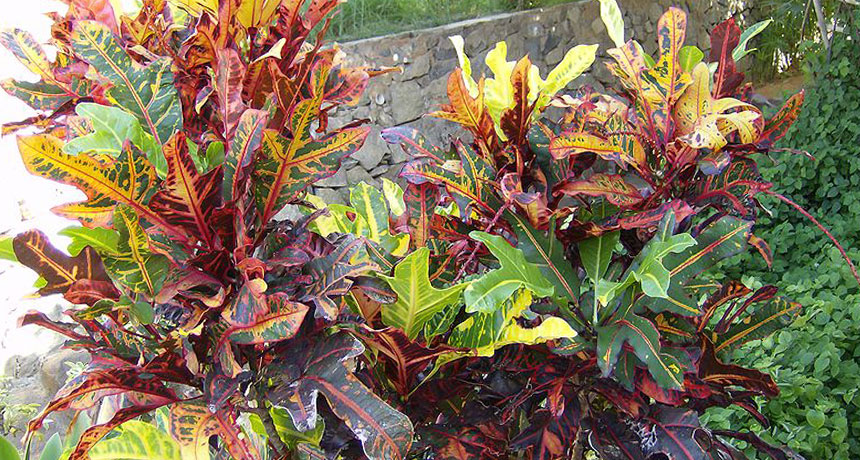Common plant could help fight Zika virus
Extract of leaves of the San Francisco plant (Codiaeum variegatum) kill larvae of a mosquito that helps spread diseases

Extracts of the San Francisco plant (the multi-colored plant here) could quash the mosquito that carries Zika and other viruses.
Wikipedia Commons / ThePhotographer
By Sid Perkins
PHOENIX, Ariz. — Substances in a common plant can kill larvae of the mosquito that helps spread the viruses that cause Zika, chikungunya and dengue fever. That’s the discovery of a teen from the Philippines. His research may help public health officials develop a way to slow the spread of those deadly diseases. It also may give homeowners hints about how to home-brew their own mosquito-killing cocktail.
Dengue (DEN-gay) virus is a leading cause of illness and death throughout the tropics and subtropics. The disease is spread by the Aedes aegypti (AY-dees Eh-JIP-tye) mosquito. Dengue causes high fevers, severe headaches and joint pain, among other symptoms. With no vaccine to prevent it, up to 400 million people contract dengue each year, according to the Centers for Disease Control and Prevention. More than one-third of all people on the planet live in areas at risk of this infection.

One is a thigh-high weed called tawa-tawa (Euphorbia hirta). Another is an attractive perennial called the San Francisco plant (Codiaeum variegatum). Because its leaves are colorful, people often plant it in gardens and yards, says Jerouen. (Known as the variegated croton, this plant also is grown as a houseplant in cooler, temperate zones.) The third is an herb called lemon grass (Cymbopogan citratus), which is used in cooking.
Many insect-killing extracts are isolated by soaking a plant’s leaves in alcohol. And that’s basically what Jerouen did. After picking the leaves, he dried them for one week. Then, he soaked each type in alcohol. Afterwards, he let the alcohol evaporate. What remained was a concentrated oily liquid full of plant-made chemicals.
He tested these extracts by dripping small quantities of them into water that contained mosquito eggs and larvae. Both tawa-tawa and lemon grass extracts caused the mosquito larvae to develop unusually. They would not have matured into healthy adults, Jerouen says. The San Francisco plant extract proved even more toxic to the insects. In just 24 hours, it had killed all of the mosquito eggs and larvae in the water.
Jerouen described his results here, May 12, at the Intel International Science and Engineering Fair. Created by Society for Science & the Public and sponsored by Intel, this year’s competition brought together more than 1,750 students from 75 countries. (SSP also publishes Science News for Students.)
Jerouen focused his research on preventing the spread of dengue fever. But in recent months, people have become even more aware of the Zika virus. It, too, is spread by mosquito bites. It can cause fevers, rashes and eye inflammation. What’s more, if a pregnant woman gets infected, her baby might end up with birth defects. And then there’s chikungunya, a devastating disease poised to hit North America. All three viruses can be transmitted by Aedes aegypti mosquitoes. This suggests Jerouen’s plant extracts might become a powerful weapon in fighting many frightening diseases.







